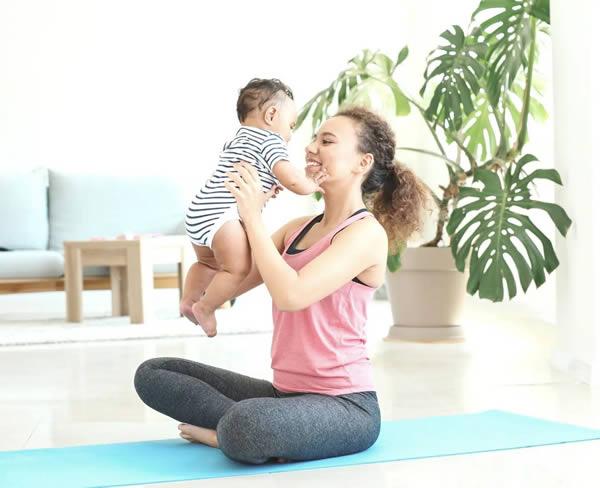
Wondering When To Start Exercising Postpartum? Exercise Guidelines Are Changing
Here’s Why Some Obgyns Recommend Waiting 12 Weeks After Birth To Workout
If you’ve just had a baby, you may be wondering when to start exercising postpartum. There is so much to keep up with when you have a newborn that it’s only natural that exercise is often the last thing on your mind right after giving birth.
But once a little bit of a routine has set in, your body will (hopefully) give you some signs that it’s time to step it up a bit:
- You are starting to regain your strength
- You are getting a little bit of sleep for a change
- The postpartum aches and pains are starting to subside
All of the above will vary from person to person and also depend greatly on the outcome of your pregnancy. To quote from the Motherly article:
Women who’ve had a healthy pregnancy and a normal vaginal delivery should be able to start doing light exercises a few days after giving birth—or when you feel ready—according to the American College of Obstetricians and Gynecologists (ACOG) and March of Dimes. The organizations both recommend asking your OBGYN before you start exercising, especially if you had a cesarean birth or complications.”
Many women can safely begin light exercise shortly after giving birth and for the first 4 to 6 weeks postpartum. Once again the intensity and duration of the exercise will be dictated by how your body is responding as well as the three bullet points above.
When you do start working out, ACOG suggests easing back into it. Aim to stay active for 20 to 30 minutes a day, starting with simple exercises that strengthen abdominal and back muscles, then slowly adding in moderate-intensity exercises and working your way up to higher-intensity workouts.”
Start with core exercises that incorporate your pelvic floor, and gradually increase impact. Start with walking before you jog, and jog before you run. Stop whatever you’re doing and see a pelvic health physical therapist if you experience any leakage, signs of prolapse (pelvic heaviness or pressure), back or joint pain.
ACOG says exercise in the postpartum period has a number of tangible benefits, such as:
- helps strengthen abdominal muscles
- boosts energy
- may prevent postpartum depression
- promotes better sleep
- relieves stress
- can help you lose extra weight you may have gained during pregnancy
Additionally, pelvic floor strength is important in new moms. Having suitable midline and pelvic floor support is essential for daily functional activities, including many of the new ones involving your little bundle of joy. To build up strength and endurance in this area, try doing some new, simple activities like lifting your baby or your stroller while contracting your pelvic floor and drawing your belly button towards your spine—regular repetition of these common movements will go a long way in helping restore your strength postpartum.
Wait to do high-intensity exercises until 12 to 16 weeks postpartum
While light exercises are OK, women shouldn’t jump back into high-intensity exercises until at least 12 weeks postpartum.
The Association of Chartered Physiotherapists in Sports and Exercise Medicine endorsed updated postpartum exercise guidelines in 2019, which recommends that most people who’ve given birth should wait to do high-impact exercises like running until 3 to 6 months postpartum, at the earliest. This can reduce the risk of health conditions like hernias, muscle tears, falls, urinary incontinence, and pelvic organ prolapse.
We therefore recommend that a low impact exercise timeline is followed within the first 3 months of the postnatal period”
Most women should not do anything strenuous [like running] for at least 12 weeks after delivery. And if you experience any signs of pelvic floor dysfunction, such as incontinence or pelvic pressure, then running is off the table until you can be evaluated.
A 2021 study found high-intensity and/or heavy load training exercises (like lifting weights) should be avoided until at least four months postpartum because “deterioration of abdominal muscle function has been noticed in this period.”
In general, women tend to return to intense exercise too soon, which can worsen pelvic floor dysfunction. You should take things at your own pace and follow your doctor’s specific guidance. Remember, whether you had a vaginal birth or cesarean delivery, your body nurtured a baby for about 40 weeks (stop for a moment to think about how beautiful that is!) and now must recover from that heroic effort.
There is lots more to know about when to start exercising postpartum at the full article at Motherly.
Click here if you are ready to work one on one with one of our trained physical therapists.
